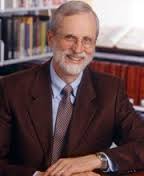A metaphor of John Steinbeck’s captures for me the formative power of communities of faith and public life. Why, he asks, should we be surprised when formed in Christian community we have the shape of a cross? Given my history, why should anyone also be surprised I became a religious educator?
My religious formation began early. I took the shape of a United Methodist Christian in family and congregational expectations and meanings associated with eating and conversing around the family table, at the communion rail, and during church potluck suppers, in telling and reading stories from the Bible (and other religious traditions), in the discussions of Sunday school, youth groups, church camp, and through our participation as a family in congregational worship and mission programs.
I was similarly formed as an educator/teacher from an early age–through expectations of parents to “show” siblings “how” to perform requested tasks, by being trained to give 4-H demonstrations at county and state fairs, in the practice of leading peers in formal learning activities in school and with special judicatory training in theological reflection in youth and campus ministry groups, and during seminary by being prepared to conduct teacher training events emphasizing theological reflection in teaching practice
A series of metaphors increasingly illuminated and shaped my religious education vocational imagination and practice. Among the most formative: at age sixteen I began a life long quest to understand the implications of Paul’s charge to the church in Rome to “Be not conformed to this world, but be transformed by the renewing of your minds so that you may discern the will of God” (12:2); In college James Joyce put words to my emerging sense of the vocational urgency in Paul’s text by claiming as an artist he went “forth each day to forge in the smithy of my soul the uncreated conscience of the race”; In seminary I encountered G. Stanley Glen’s metaphor for the teaching ministry as “the fleshly spearhead of the gospel” pricking self-deceptions and opening up life transforming possibilities of self-consciousness in the liberative work of the people of God. It should be no surprise I found resonance in Maxine Greene’s image of the liberative teacher “as stranger” or that in Ellis Nelson’s claim that communities form faith, I would re-discover the “truth” of his insight in my own experience–a view later reinforced in graduate school by Lawrence Cremin’s exploration of the formational influence in a society’s configuration of educational agencies.
As a neophyte Minister of Education in a local church, I began to articulate “the passion” in my vocation as “loosening the bonds of ignorance that enslaves people from experiencing the transformative power of God’s redemptive love”. With hindsight I am aware my growing understanding of this vocational focus had been influenced by the interdependence of biblical themes of justice and liberation, love and community in seminary classes taught by James Muilenburg, Samuel Terrien, W.B. Davies, and Robert MacAfee Brown while I was at the same time trying to make sense of a religious education ministry with a racially, culturally, and economically diverse group of junior high youth at Riverside Church. Field education director John Casteel and supervisor Eugene Laubach created a safe place for me to negotiate tensions between the cognitive silos and applied theological perspectives of the seminary curriculum with my emerging sense of religious education as a theological practice in my interactions with these youth.
Colleagues have been crucial empowering partners and mentors in my vocational formation: at Methesco Bob Browning invited me to co-teach my first introductory course and he, with Everett Tilson, Bogie Dunn, and Ethel Johnson modeled for me the engaged life of the liberative teacher, at Scarritt with Jack Seymour and Bob O’Gorman I experienced the power of learning and teaching in community; At Candler/Emory with Rebecca Chopp, Luke Johnson, Luther Smith, Jim Fowler, Rod Hunter, Liz Bounds, Grant Shockley and others I participated in powerful theologically engaged ecclesial conversation. The questions, challenges, and creative work of laity in congregations, seminary and graduate students, colleagues, and the authors of many books from many fields consistently invited me to loosen the bonds of my own vocational ignorance so as to be increasingly open to the thought and practice of being a religious educator in the larger Christian world, in public life, and eventually among the religions of the world.
There is more to say. I have not described my vocational transformation from ecclesial to academic to “retired” religious educator or named books influencing my vocational journey. But I have no more space.

